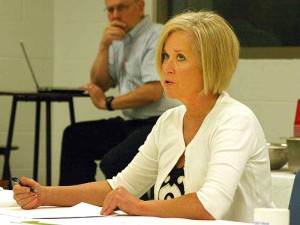School board reviews teacher self-assessment system, GT policy changes
By JIM BROOKS
Nelson County Gazette / WBRT Radio

Superintendent Anthony Orr makes a point during a discussion of the PGES at Thursday’s board working session.
Thursday, Aug. 7, 2014 — The manner in which Nelson County Schools teachers evaluate their own classroom effectiveness will change dramatically this school year. In a presentation during the Nelson County Board of Education’s monthly working session, Tim Beck, director of the district’s elementary schools, reviewed part of the Professional Growth and Effectiveness System (PGES) that focused on a teacher’s evaluation of their teaching skills.
Beck explained that the district’s teachers will now do self-reflection on the effectiveness, a process that won’t be based solely on opinion or anecdotal evidence. The new system is data driven, and will help teachers understand their strengths and weaknesses in classroom effectiveness.
PGES isn’t a system to punish teachers, but to help teachers identify opportunities to improve their skills, Beck explained.
Several board members asked if PGES would be helpful in identifying quality teachers who apply from other school districts. Superintendent Anthony Orr told the board PGES information would not be available for those sorts of evaluations. Likewise the PGES data would not be used to identify teachers who needed to be fired.
PGES “is not a ‘got-ya’ thing, its a ‘grow-ya’ thing,” he explained.
Orr explained after the meeting that the system will add more tasks to teachers and administrator’s already busy schedules.
PGES is a program conducted by the Kentucky Department of Education and housed on their servers, Beck explained. He has been presenting the board with overviews of parts of the program for several months.
GIFTED & TALENTED. The district’s handbook regarding services for gifted and talented students has been significantly revised, Beck told the board. The manual has been updated to reflect new regulations and policies, and it changes the ways in which gifted and talented (GT) students are identified.
The handbook also reflects the change in who provides gifted and talented services to students. In the past, a GT services coordinator would visit a school and work with students, which often meant trips as a GT group to special events or places. Now, the student’s classroom teacher will be responsible for providing GT services to those students.
The role of the GT services coordinator has been rolled into the new position of Instructional Coach (IC), Orr explained. The IC will be responsible for insuring that the GT students get the services they need according to their plan.
Board member Diane Berry questioned the changes, stating that she felt a separate GT person that could help provide special learning opportunities was beneficial to those students. Gifted and talent students need to be pushed to learn more because they have the capability to do so, she said.
“If you are a gifted and talented student, you should be able to do those extra things, there should be a lot of enrichment activities for these kids,” she told the board. “To put it on the Instructional Coach or the teacher … I just have a problem with that.”
Beck said the new system will improve GT education by not relying on a handful of individual GT educators to offer those services, and will instead allow the Instructional Coaches who will follow up on gifted and talent services for students.
NEW FIELD TRIP CHAPERONE GUIDELINES. After receiving approval from the Kentucky School Board Association, the district’s new policy will allow parents who are official field trip chaperons to ride district school buses if room is available.
The change was introduced to the board by Sara Wilson, the district’s executive director of student support. Schools would be responsible for making sure parents who wish to chaperon have the necessary background checks, she said.
“What it comes down to is that if parents want to go on a field trip with their child and wish to ride the bus will need to serve as chaperon,” Orr said, noting that it was only on a space-available basis.
TAX RATES. Tim Hockensmith, the district’s chief operating office, told the board he had not received the tax rate information from the state. The district has 30 days from the time it receives that information to set its tax rates. That process will require a public hearing. Hockensmith said he would keep the board informed.
-30-







